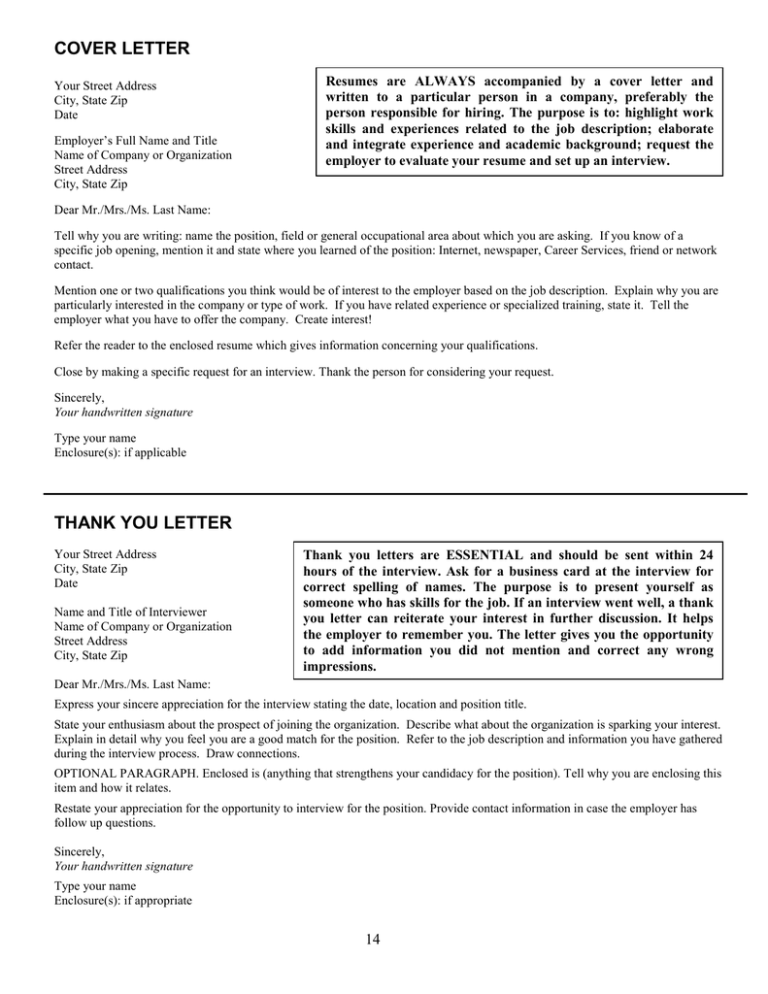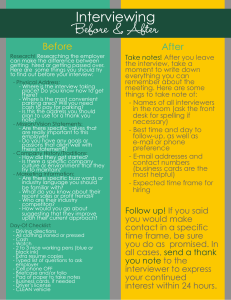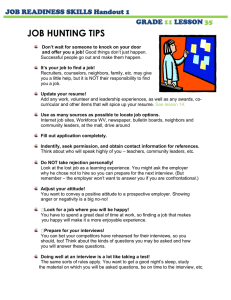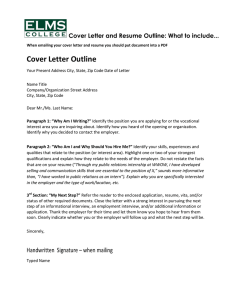COVER LETTER
advertisement

COVER LETTER Your Street Address City, State Zip Date Employer’s Full Name and Title Name of Company or Organization Street Address City, State Zip Resumes are ALWAYS accompanied by a cover letter and written to a particular person in a company, preferably the person responsible for hiring. The purpose is to: highlight work skills and experiences related to the job description; elaborate and integrate experience and academic background; request the employer to evaluate your resume and set up an interview. Dear Mr./Mrs./Ms. Last Name: Tell why you are writing: name the position, field or general occupational area about which you are asking. If you know of a specific job opening, mention it and state where you learned of the position: Internet, newspaper, Career Services, friend or network contact. Mention one or two qualifications you think would be of interest to the employer based on the job description. Explain why you are particularly interested in the company or type of work. If you have related experience or specialized training, state it. Tell the employer what you have to offer the company. Create interest! Refer the reader to the enclosed resume which gives information concerning your qualifications. Close by making a specific request for an interview. Thank the person for considering your request. Sincerely, Your handwritten signature Type your name Enclosure(s): if applicable THANK YOU LETTER Your Street Address City, State Zip Date Name and Title of Interviewer Name of Company or Organization Street Address City, State Zip Thank you letters are ESSENTIAL and should be sent within 24 hours of the interview. Ask for a business card at the interview for correct spelling of names. The purpose is to present yourself as someone who has skills for the job. If an interview went well, a thank you letter can reiterate your interest in further discussion. It helps the employer to remember you. The letter gives you the opportunity to add information you did not mention and correct any wrong impressions. Dear Mr./Mrs./Ms. Last Name: Express your sincere appreciation for the interview stating the date, location and position title. State your enthusiasm about the prospect of joining the organization. Describe what about the organization is sparking your interest. Explain in detail why you feel you are a good match for the position. Refer to the job description and information you have gathered during the interview process. Draw connections. OPTIONAL PARAGRAPH. Enclosed is (anything that strengthens your candidacy for the position). Tell why you are enclosing this item and how it relates. Restate your appreciation for the opportunity to interview for the position. Provide contact information in case the employer has follow up questions. Sincerely, Your handwritten signature Type your name Enclosure(s): if appropriate 14 Tips for Writing and Producing Job-Search Correspondence Job-search letters should reflect sound writing practices and promote your candidacy. You must communicate your value to a perspective employer in an understandable, brief and positive way. The following guidelines would ensure that you reach these goals: • Write your letters in a professional manner. Your letters should act as a marketing tool that should address the needs of the employer. Focus on employer needs and how you can meet them. • Show your appreciation to the employer for considering your application. • Keep the letter to one page. Eliminate all extraneous words, and avoid revisiting information from your resume. • Use high quality paper and envelopes for your letters. • Always address your letters to a specific individual with his or her correct business title and address. • Check for spelling errors or other typos. The copy you submit should be error free. • Be timely. Show that you know how to meet and keep deadlines for yourself and for others. • Be honest. Always back up your claims with evidence and examples from prior experience. Guidelines for Great Style in your Writing These tips will help you improve the clarity and positive impact of your messages. • Decide your purpose for writing, and then plan accordingly. You should begin with the most important information first, supported by facts. • Group similar items together in a paragraph, and organize the paragraph in logical relationship to the others. Do the work of organizing the information for the readers. • Keep your letters personal, warm, and professional. Be careful and avoid becoming overly familiar or too casual. Keep in mind that business letters are formal documents. • Say what you mean directly, avoid too much prose. Demonstrate that you understand the value of the reader’s time by being as brief as possible. • Write clearly and simply. Avoid jargon and overly complex sentences. • Be positive in content, tone, word choice, and expectations. Suggest that you are an optimistic, responsible, productive, and reasonable person. • Keep the reader’s interest by varying sentences in structure and length. • Reduce uncertainty and abstraction for the reader by including specific facts. • Provide information that reflects the reader’s interest. Stress the benefits for the reader.




